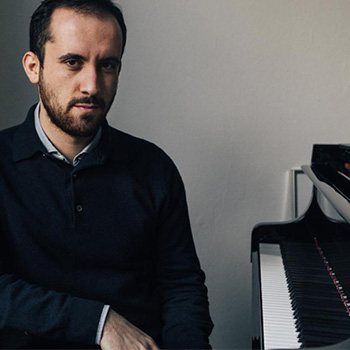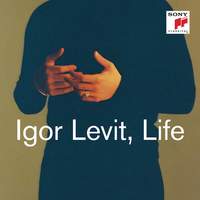Recording of the Week,
A moving recital from Igor Levit with music by Bach, Liszt and Wagner
One of the most moving live performances I've witnessed in recent years was Igor Levit's impromptu account of the Aria from Bach's Goldberg Variations at St John's Smith Square at the 2016 Gramophone Awards: ostensibly given as a coda to his acceptance speech after his album of variations by Bach, Beethoven and Rzewski won the Recording of the Year, it also served as an intensely personal requiem for a close friend who had recently died suddenly, and though the Russian-born pianist was on typically succinct and understated form he was clearly still coming to terms with a devastating loss.
 His new 'Life Album' (released on Sony Classical today) seems in many respects to be an extension of that evening's elegy as well as a musical autobiography of sorts: though the majority of the composers featured here (including the triumvirate who appeared on that astonishing triptych of variations from 2015) have figured prominently in Levit's career to date, almost all of the works on the album also deal in some way with transfiguration and transcendence.
His new 'Life Album' (released on Sony Classical today) seems in many respects to be an extension of that evening's elegy as well as a musical autobiography of sorts: though the majority of the composers featured here (including the triumvirate who appeared on that astonishing triptych of variations from 2015) have figured prominently in Levit's career to date, almost all of the works on the album also deal in some way with transfiguration and transcendence.
On the most literal level, several of the pieces are transcriptions (we open with Busoni's mighty fantasia on Bach's BWV253, moving through Brahms's left-hand arrangement of the great D minor chaconne, then - by way of Schumann's Ghost Variations - onto two of Liszt's Wagner paraphrases and Meyerbeer-via-Busoni), but transformation in a more ephemeral sense is also a theme throughout: it's surely no accident that the Liszt/Wagner pieces both depict mystical release from suffering, and the Schumann Variations were completed in a haze of manic creativity just days after the composer attempted to drown himself in the Rhine. At the heart of the programme is Frederic Rzewski's bluesy, lullaby-like elegy A Mensch, composed in 2012 in memory of his friend Steve Ben Israel, an American performance-artist; given Levit's close relationship with the composer (whose Variations on 'The People United Will Never Be Defeated' he has championed on record and in recital), it seems entirely fitting that he appropriated it with Rzewski's blessing in the wake of his own bereavement.
All of the qualities which made Levit's readings of the Goldberg and Diabelli Variations so treasurable are in evidence in each individual interpretation here, as well as in the curation of the programme itself: this is a musician with an uncanny ability to balance head and heart, and whilst everything's underpinned by formidable technique and a rigorous intellectualism that borders on the austere, the emotional arc of each work and of the album as a whole is masterfully realised. (Unusually for a concept-album, I'd advise skipping the oddly convoluted sleeve-note and diving straight into the music: the unpretentious directness of Levit's playing is entirely engaging on its own terms, and the booklet-essay - by a third party rather than the pianist himself, and perhaps muddied a little in translation - does little to illuminate things further, though the simplicity of Levit's own poem to his late friend is touching).
As with his trio of variations a couple of years ago, Levit summons such an astounding range of colours and textures that I had to check the booklet-notes to make sure that the entire programme had been recorded on just one instrument rather than split between a Steinway, a fortepiano and even on occasion an organ: it's hard to believe that the extraordinary delicacy at the opening of the Schumann (shades of an Érard piano here) and the massive sonorities conjured in the Busoni emanate from the same keyboard, and in the transcription of the Grail Scene from Parsifal the sound-world expands to truly orchestral dimensions (I honestly don't think I've heard Wagner performed with such clarity and blend since experiencing Kirill Petrenko's unforgettable Bayreuth Götterdämmerung a couple of years back). The sustained line achieved with one hand in the Brahms is also a marvel, and had me wondering what Levit might do with Ravel's concerto for the same 'forces'; there's no over-reliance on the pedal here, and Bach's underlying structure is firmly etched throughout without ever descending into pedantic percussiveness.
After the vast 'cathedrals of sound' evoked in the Liszt, Brahms and Busoni, Bill Evans's four-minute A Peace Piece seems like an oddly low-key coda on paper, but in practice it works beautifully; this secular 'Dona nobis pacem' harks back to the jazz-inflected world of the Rzewski and brings this eclectic, strangely moving album to an appropriately eloquent close. I'd be extremely surprised if it isn't as garlanded with awards as its predecessors by this time next year.
Igor Levit (piano)
Available Formats: 2 CDs, MP3, FLAC, Hi-Res FLAC



